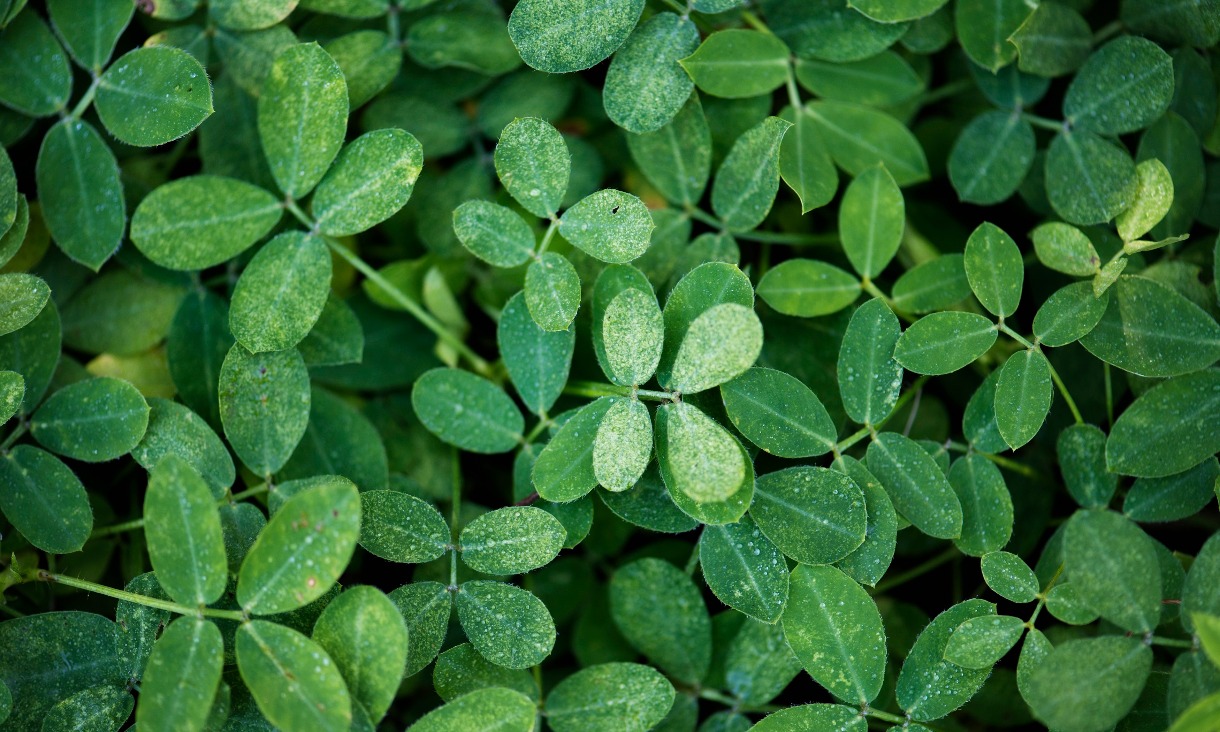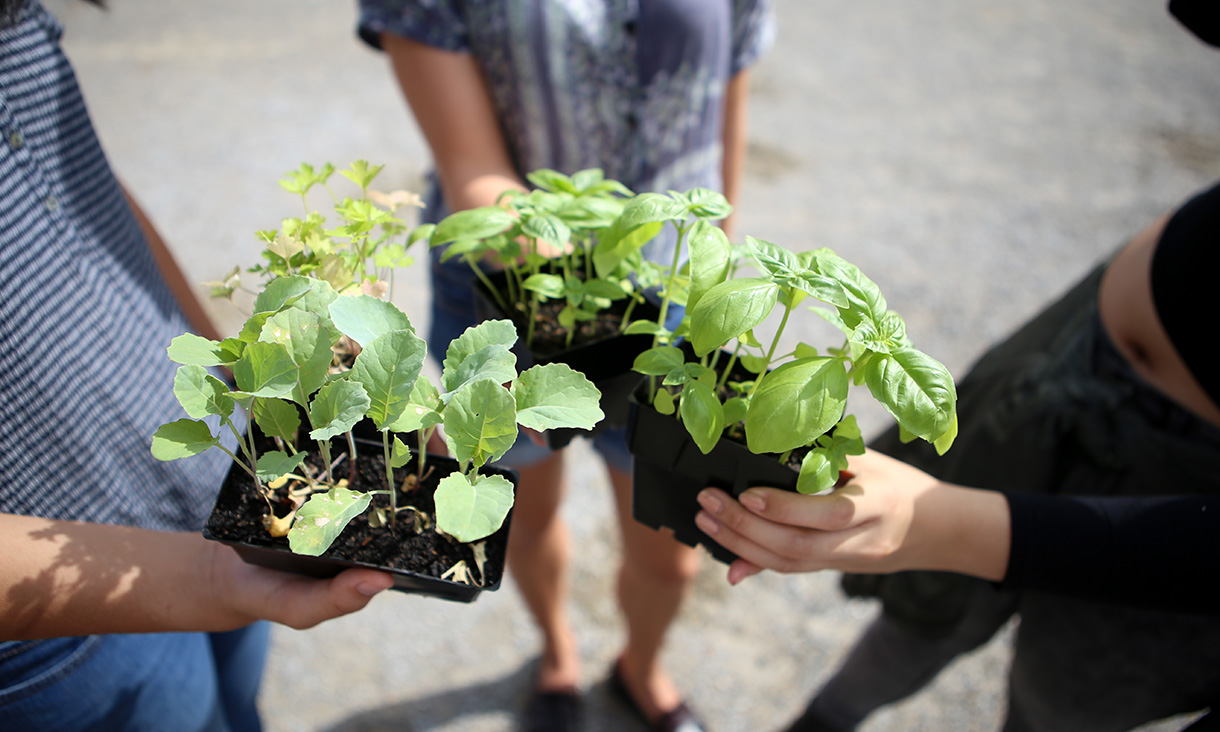
RMIT sustainability initiatives
RMIT is passionate about being a sustainability leader, not just in the sector but Australia-wide. Here we highlight a few of the sustainability initiatives we've put in place to drive change through collaboration and genuine action.

Our buildings
RMIT incorporates sustainable design principles into all new build and refurbishment projects.
The New Academic Street Project, which achieved a 5-star Green Star As-built rating, utilises both natural and mechanical ventilation schemes so that more favourable outdoor weather conditions can permeate the building.
Many of the student learning spaces were designed as ‘mixed mode’, featuring balconies and a network of new laneways. The laneways themselves are all-weather spaces, fully naturally ventilated, and lend the project a characteristic Melbourne flavour.
The interiors were developed through minimal interventions into the existing buildings structural fabric, and with sustainable materials used throughout, including paints, carpets, furniture and joinery.
The University undertook ‘adaptive re-use,’ stripping back the lower levels of the existing concrete-encased steel buildings, with floor plates repurposed to meet the needs of the RMIT community.
Large, dark lecture theatres were repurposed, creating light and comfortable tiered student study spaces. The façades have now been opened-up to create new outdoor spaces.
The four-storey Garden Building and Terrace was integrated into the campus, creating additional social spaces for staff and students. Built using lower impact sustainable cross- laminate timber, the building is characterised by the widespread use of greenery and open garden space to enhance the urban environment.
Other sustainability initiatives include thermal heat recovery, stormwater management and water sensitive urban design.
Our commitment to climate change action
RMIT is working towards a goal to be carbon neutral by 2030, continuing to implement energy efficiency across our portfolio and pursue appropriate emissions reduction opportunities.
A $128M Energy Efficiency Program across all three Victorian campuses achieved a 45% emissions reduction on campus in 2018 compared to a 2007 baseline.
This has been achieved through a range of improvements including generating our own electricity on campus (co-generation and tri-generation), LED lighting upgrades, boiler replacements, chiller replacements and HVAC controls improvements.
We have recently installed over 1,500 solar panels in the Carlton precinct, bringing our on-site renewable generation to 600kW.
RMIT directly supported the construction of a new windfarm at Crowlands Victoria (20km north of Ararat) which now provides 25% of our electricity. We undertook this project with the City of Melbourne and 12 other industry partners; more information can be found online at the Melbourne Renewable Energy Project.
We are continuing to embed energy efficiency and sustainability into all the projects we deliver at RMIT as we work towards our carbon neutral 2030 target.
Waste and re-use
RMIT works closely with our independent retailers on campus to bring them along on our sustainability journey by encouraging them to implement sustainability initiatives.
A successful food waste collection service trial with Boost Juice is now being extended to more cafes on our campuses, including RUSU Real Foods, whic also has a food growing group.
Given the pressing enviornment issue of single-use plastics, we've issued requests to our retailers asking them to consider removing all drinking straws, and minimising packaging.
Waste avoidance is a key focus, as even composable or biodegradable packaging is problematic in commercial composting facilities, being slow to breakdown and carrying the risk of causing contamination in mixed recycling streams.
The majority of our cafes offer a discount for people who bring their own reusable cups and STREAT cafe recycles its coffee grounds.
There is a range of reusable cups and bottles in stock at the Campus Store, and environmentally-sound student/alumni enterprises like BeeKeeper Parade are also showcased. We continue to identify other products such as the Cutlery Carriage, another RMIT student innovation.
The Campus Store also recently worked with Masters of Fashion (Entrepreneurship) students to look at the sustainability of their clothing range and developing a sustainable sourcing framework.
We regularly produce signage and communications materials to engage staff and students in our sustainability initiatives.
Other initiatives
Other sustainability initiatives include:
- A high-level Sustainability Committee and Sustainability Policy in place since 2009 to ensure strong governance and support for sustainability
- Implementation of a Waste Management Plan for the University - working with cleaning contractors to improve recycling systems and processes, including scoping communal recycling hubs on each campus for batteries and mobile phones
- Developing an online portal with our removalists to enable good quality furniture to be reused throughout other University projects before recycling
- Implementation of a Sustainable Transport Plan creating ‘Bike Hub’ infrastructure on each campus and hosting Ride to Uni Days to encourage cycling
- Installing drinking fountains across campuses and having reusable drinks bottles and reusable straw giveaways at key events
- Supporting our events teams to deliver more sustainable events in line with our Sustainable Events Guide
- Developed Responsible Investment Principles which continue to be implemented to drive sustainable change in our investments.
- Running a wide range of sustainability initiatives and event throughout the year for staff and students to get involved in and gain new knowledge and skills.
- Undertaking lectures and ‘living lab’ projects with students so they can use the campus as a learning tool for sustainability
- The RMIT Sustainability Team collaborated with the 21CC Team to develop a suit of sustainability micro-credentials available to students and staff
- Supporting staff teams that participate in the 'Green Impact' behaviour change program which looks at a range of sustainability issues in their work context
- Implementing a Sustainability Ambassadors program for students each year
- Creating a dedicated role to embed the UN Sustainable Development Goals across all areas of RMIT
At the end of 2018, RMIT was recognised for its long-term commitment to sustainability with the top Green Gown award for ‘Continuous Improvement: Institutional Change’. We were honoured to be the first organisation to win this award twice.
More details can be found in the Sustainability Annual Report.
***
For media enquiries, please contact RMIT Communications: 0439 704 077 or news@rmit.edu.au
- Sustainability
Acknowledgement of Country
RMIT University acknowledges the people of the Woi wurrung and Boon wurrung language groups of the eastern Kulin Nation on whose unceded lands we conduct the business of the University. RMIT University respectfully acknowledges their Ancestors and Elders, past and present. RMIT also acknowledges the Traditional Custodians and their Ancestors of the lands and waters across Australia where we conduct our business - Artwork 'Sentient' by Hollie Johnson, Gunaikurnai and Monero Ngarigo.